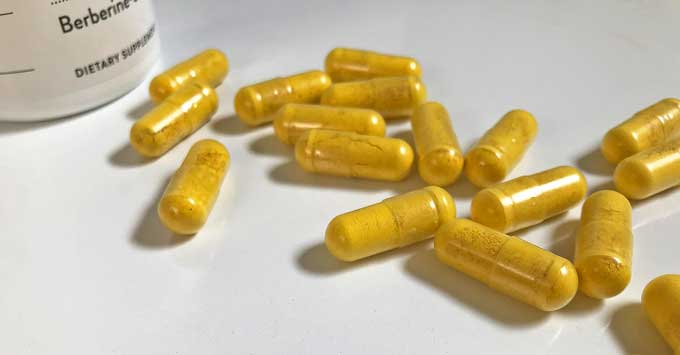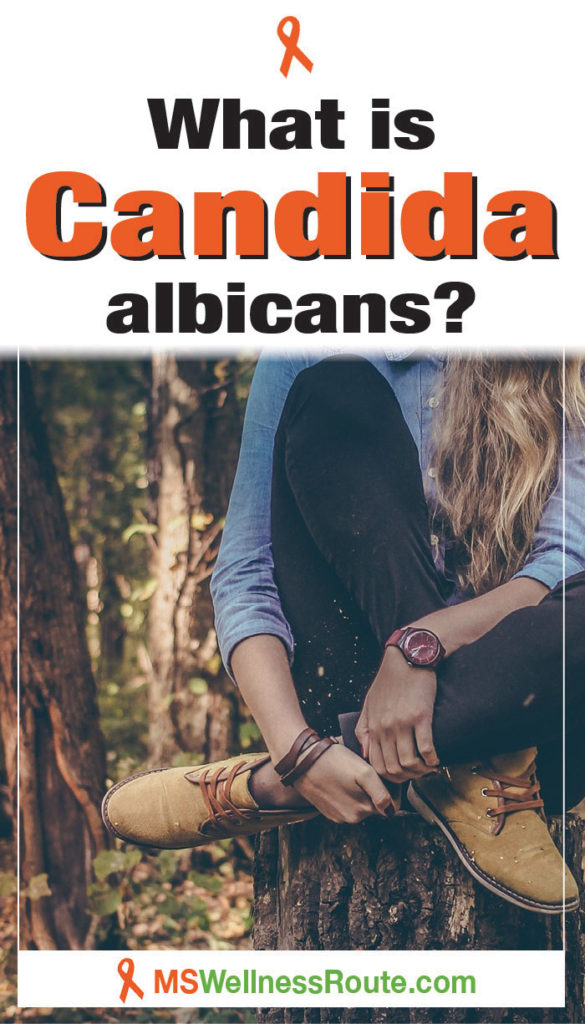Last Updated on November 21, 2023 by Cathy

Candida albicans is a type of yeast that lives naturally in and on our bodies. When it grows out of control or enters deep into the body it can cause many health issues. Candida infections include athlete’s foot, dandruff, nail fungus, and oral thrush. When it becomes invasive it moves deep into the body and into the bloodstream and organs. This affects the blood, bones, brain, eyes, heart, and central nervous system.
Researchers found bacteria to play a role in multiple sclerosis (MS). Fungi may also play an important role. There are many studies linking fungi and autoimmune diseases including MS. A small study from 2008, found 7 out of 8 MS patients had serum antibodies against Candida. They also found healthy patients had none.
Researchers repeated another study in 2010 and 2013 on a larger case-control. They found evidence linking MS “to a possible fungal etiology.” Regardless Candida causes MS or not there are many studies linking them together.
So what does this mean for you?
It means, there’s a really good chance you have Candida overgrowth. Candida albicans is a parasitic fungus. Under ideal conditions, for people with a healthy gut, Candida stays in check. As soon as there’s a disturbance like taking antibiotics candida begins to grow. As it multiplies the intestinal wall weekends. Then it separates allowing candida to enter the bloodstream and organs. It causes serious serious health issues when Candida becomes evasive.
What is Candida:
- A normally occurring yeast found mostly in the GI tract
- Stays in balance with friendly bacteria
- Is found inside and outside of the body
- Antibiotics are the leading cause of Candida overgrowth
- Poor diet and lifestyle and stress feed candida
- Yeast overgrowth is frequently missed-diagnosed
Candida can mutate and grow throughout the body making it hard to control.
Causes of Candida overgrowth:
- Antibiotics
- Antibiotics in Meats
- Chlorinated water
- Diabetes
- Exposure to chemicals, heavy metals, and toxins
- Mold exposure
- Poor diet high in junk food and sugar
- Stress
Antibiotics are a big cause of yeast infections. Because they kill the good bacteria allowing the yeast to grow.
Signs of Yeast Overgrowth

I started eating a healthy diet in 2006. I stopped having MS exacerbations but my symptoms were reversing. It wasn’t until years later I realized I was dealing with severe yeast overgrowth.
Once I started on a personal Candida protocol my symptoms began to reverse. Such as the pins and needles sensation in my feet and my heat intolerance. I suffered from heat intolerance for about 20 years, I never dreamed it would disappear.
Signs of Candida Overgrowth:
- Athletes foot
- Anxiety/depression
- Brain fog
- Chemical sensitivity
- Constipation/diarrhea
- Dizziness
- Fatigue
- Indigestion
- Loss of libido
- Muscle pain
- Nail fungus
- Oral thrush
- Skin issues such as acne, psoriasis, rashes, etc.
- Stiffness
- Sugar cravings
- Yeast infections (women)
Contact a functional medicine practitioner if you really want to get tested. They will perform an ELISA blood test, stool test, or urine test. You could also use an online lab like Walk-in Lab. Online labs don’t require insurance or a doctor’s visit.
I didn’t want to spend more money on another test so I passed. After reading the book Healing Multiple Sclerosis I knew I had Candida.
How to Overcome Candida’s Overgrowth
First, stop feeding the yeast overgrowth by giving it what it needs to grow and that is sugar. Avoid junk food, processed foods, and refined sugar. No more fast-food restaurants or pizza delivery.
Instead, eat an anti-inflammatory diet that promotes health without feeding Candida. If you currently eat processed foods you can do this in steps so it’s not so overwhelming.
Steps to eating an anti-inflammatory diet:
- Avoid junk food
- Stop eating gluten and grains (reintroduce gluten-free grains after you heal your gut)
- Eliminate all dairy products
- Avoid legumes (beans, peanuts, soy)
- Avoid alcohol
- Eat lots of vegetables except corn (organic if possible to avoid pesticides)
- Use lots of herbs such as cinnamon, garlic, ginger, turmeric, etc.
- Eat no more than one cup of berries each day (you are free to eat avocados, lemons, and limes)
- Only eat grass-fed red meat once a week
- Eat pasture-raised poultry
- Eat wild-caught fish (avoid tuna since it’s high in mercury)
- Avoid foods you’re sensitive to such as chocolate, nightshades, etc.
Beneficial Herbs and Supplements

Antifungals– eating a low-sugar diet is the first step but you also need to include antifungals. They come as food, herbs, and supplements. Always start slow to avoid die-offs, this happens when the yeast quickly dies off and the liver can’t keep up.
Herbs to kill the overgrowth:
- Berberine
- Black walnut
- Cinnamon
- Clove
- Coconut products
- Colloidal silver
- Garlic
- Grapefruit seed extract
- Pau d’arco (tea, powder, or supplements)
- Wormwood
Digestive enzymes – it’s important to work on healing your leaky gut. Digestive enzymes help by breaking down the food. You don’t need to stay on it forever but it may be helpful during the first month.
Probiotics – help by increasing the good bacteria. The more good bacteria you have in your gut the fewer bad bacteria and reduces overgrowth.
Fix Your Leaky Gut
Having MS and Candida means you have a leaky gut. It also means you have a leaky brain causing brain fog and memory loss. Candida attacks all organs including the brain. A leaky gut allows larger particles to pass the gut lining. Once you fix your leaky gut you’ll be able to reintroduce foods you once were sensitive to.
You may enjoy reading Tips To Heal Your Leaky Gut
Steps to heal a leaky gut:
- Eat an anti-inflammatory diet (see steps above)
- Eat 9 cups of vegetables each day (including one cup of fruit)
- Include healthy fats like salmon and olive oil
- Avoid drinking alcohol
- Stop using NSAIDS (aspirin, ibuprofens, Tylenol)
- Drink bone broth
- Eat fish 4 times a week
- Don’t eat raw sulfur vegetables (they’re harder on the gut lining)
- Use supplements such as L-glutamine, collagen, digestive enzymes, probiotics
Don’t Stop Moving
Moving and exercising are very important. It helps with circulation, and better balance, and keeps you mobile as long as possible. Regular exercise helps with balance, flexibility, mobility, and overall quality of life. It also improves energy, heart health, and lung function, and strengthens bones and muscles. Staying active not only helps physically but also mentally. Exercising releases feel-good hormones to help lift your spirit. Even if you aren’t mobile there are exercises you can still do.
Exercises for MS:
- Balance exercises
- Qigong
- Resistance training
- Stretching
- Swimming
- Tai chi
- Walking
- Yoga
Manage Your Stress
MS is an inflammatory and autoimmune neurological disease. Environmental exposures are the leading factors to the onset of MS. Environmental factors include chemicals, vitamin D deficiency, and stress. Stress is the root cause of chronic inflammation, stress causes disease. The World Health Organization (WHO) says stress is the epidemic of the 21st century.
Easy ways to lower your stress:
- Exercise
- Get a massage
- Listen to music
- Practice mindfulness
- Soak in a warm bath
- Soak up some sun (vitamin D)
- Spend time in nature and listen to the sounds
- Take several deep breaths throughout the day
- Think positive thoughts about yourself
- Use essential oils like Stress Relief or Chill Out
- Walk (or sit) barefoot on the grass
Stress raises cortisol levels which regulate blood sugar, digestion, and inflammation. Too much cortisol leads to many health conditions. Such as brain fog, heart disease, trouble sleeping, and anxiety/depression.
Stress increases blood sugar which feeds Candida. Candida doesn’t care where the sugar comes from as long as it’s fed. Stress also can lead to an MS exacerbation or relapse.
What is Candida Albicans?
What is Candida Albicans? Candida albicans is an opportunistic fungus that wreaks havoc on the entire body. Many studies suggest that Candida may be associated with increased odds of MS.
Candida overgrowth could possible be the primary cause of your MS.

Free Wellness Library!
Subscribe for free and I’ll send you the password to my secret library filled with many printables for your wellness journey.
Want to remember this health tip? Pin it to your favorite Pinterest board!

Resources:
https://pubmed.ncbi.nlm.nih.gov/20556470/
https://pubmed.ncbi.nlm.nih.gov/32856162/
https://www.ncbi.nlm.nih.gov/pmc/articles/PMC5650687/
https://en.wikipedia.org/wiki/Candida_albicans
What is Candida Albicans?





